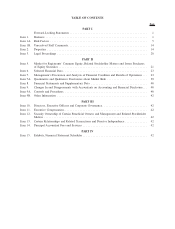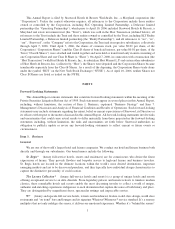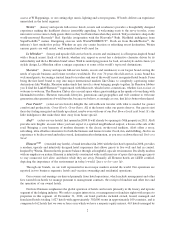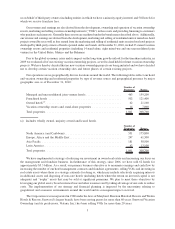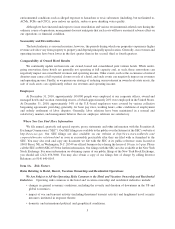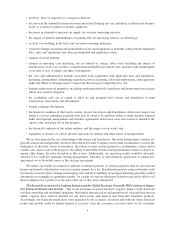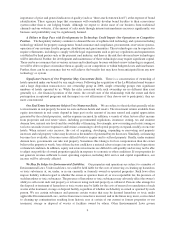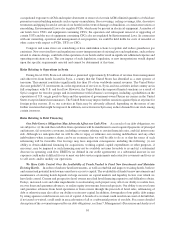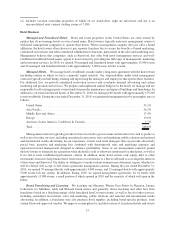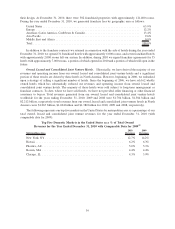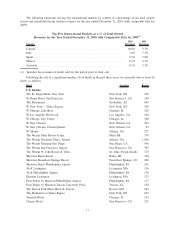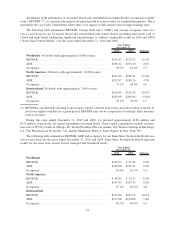Starwood 2010 Annual Report Download - page 78
Download and view the complete annual report
Please find page 78 of the 2010 Starwood annual report below. You can navigate through the pages in the report by either clicking on the pages listed below, or by using the keyword search tool below to find specific information within the annual report.occupational exposure to ACMs and require abatement or removal of certain ACMs (limited quantities of which are
present in various building materials such as spray-on insulation, floor coverings, ceiling coverings, tiles, decorative
treatments and piping located at certain of our hotels) in the event of damage or demolition, or certain renovations or
remodeling. Environmental Laws also regulate PCBs, which may be present in electrical equipment. A number of
our hotels have USTs and equipment containing CFCs; the operation and subsequent removal or upgrading of
certain USTs and the use of equipment containing CFCs also are regulated by Environmental Laws. In connection
with our ownership, operation and management of our properties, we could be held liable for costs of remedial or
other action with respect to PCBs, USTs or CFCs.
Congress and some states are considering or have undertaken actions to regulate and reduce greenhouse gas
emissions. New or revised laws and regulations or new interpretations of existing laws and regulations, such as those
related to climate change, could affect the operation of our hotels and/or result in significant additional expense and
operating restrictions on us. The cost impact of such legislation, regulation, or new interpretations would depend
upon the specific requirements enacted and cannot be determined at this time.
Risks Relating to Operations in Syria
During fiscal 2010, Starwood subsidiaries generated approximately $2 million of revenue from management
and other fees from hotels located in Syria, a country that the United States has identified as a state sponsor of
terrorism. This amount constitutes significantly less than 1% of our worldwide annual revenues. The United States
does not prohibit U.S. investments in, or the exportation of services to, Syria, and our activities in that country are in
full compliance with U.S. and local law. However, the United States has imposed limited sanctions as a result of
Syria’s support for terrorist groups and its interference with Lebanon’s sovereignty, including a prohibition on the
exportation of U.S.-origin goods to Syria and the operation of government-owned Syrian air carriers in the United
States except in limited circumstances. The United States may impose further sanctions against Syria at any time for
foreign policy reasons. If so, our activities in Syria may be adversely affected, depending on the nature of any
further sanctions that might be imposed. In addition, our activities in Syria may reduce demand for our stock among
certain investors.
Risks Relating to Debt Financing
Our Debt Service Obligations May Adversely Affect our Cash Flow. As a result of our debt obligations, we
are subject to: (i) the risk that cash flow from operations will be insufficient to meet required payments of principal
and interest, (ii) restrictive covenants, including covenants relating to certain financial ratios, and (iii) interest rate
risk. Although we anticipate that we will be able to repay or refinance our existing indebtedness and any other
indebtedness when it matures, there can be no assurance that we will be able to do so or that the terms of such
refinancing will be favorable. Our leverage may have important consequences including the following: (i) our
ability to obtain additional financing for acquisitions, working capital, capital expenditures or other purposes, if
necessary, may be impaired or such financing may not be available on terms favorable to us and (ii) a substantial
decrease in operating cash flow, EBITDA (as defined in our credit agreements) or a substantial increase in our
expenses could make it difficult for us to meet our debt service requirements and restrictive covenants and force us
to sell assets and/or modify our operations.
We Have Little Control Over the Availability of Funds Needed to Fund New Investments and Maintain
Existing Hotels. In order to fund new hotel investments, as well as refurbish and improve existing hotels, both we
and current and potential hotel owners must have access to capital. The availability of funds for new investments and
maintenance of existing hotels depends in large measure on capital markets and liquidity factors over which we
have little control. Current and prospective hotel owners may find hotel financing expensive and difficult to obtain.
Delays, increased costs and other impediments to restructuring such projects may affect our ability to realize fees,
recover loans and guarantee advances, or realize equity investments from such projects. Our ability to recover loans
and guarantee advances from hotel operations or from owners through the proceeds of hotel sales, refinancing of
debt or otherwise may also affect our ability to raise new capital. In addition, downgrades of our public debt ratings
by rating agencies could increase our cost of capital. A breach of a covenant could result in an event of default that,
if not cured or waived, could result in an acceleration of all or a substantial portion of our debt. For a more detailed
description of the covenants imposed by our debt obligations, see Item 7, Management’s Discussion and Analysis of
10


